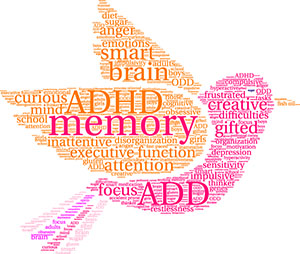ADHD Can Be a Challenging Gift. I would like to help you. Call 215-322-6781 for a no obligation phone consultation to see if my services are right for you.

Having trouble concentrating? Cannot sit still? Are you disorganized and always late? If so, and if you have always been that way, it might not be a flaw in your personality but ADHD. Everyone has heard of attention deficit hyperactivity disorder (ADHD) in children, but it can also carry over into adulthood.
The good news is that there are many successful children, adolescents and adults who have ADHD.
Some of the negative attributes can be positive as well:
- ADHD can foster curiosity, creativity, and ability to solve problems in innovative ways.
- Impulsiveness includes a tendency to be bored with whatever everyone else is doing or thinking. This can be a key ingredient for forging new ground in areas of study or thought.
- Distractibility is shifting attention to other arenas and can enhance creativity by mixing together ideas from different domains that seem separate or irrelevant to each other.
How common is ADHD and what are the risks?
- About 3-5 percent of children have the disorder. Up to 65 percent will continue to have symptoms, to an impairing degree, in adulthood.
- In children, the ratio of boys to girls [diagnosed with ADHD] is 3 to 1, because boys tend to show more signs of the disruptive behavior. But in adults, the ratio of males to females with ADHD is 1 to 1, as inattention becomes the symptom driving impairment.
- Research suggests that children with ADHD are more likely than their non-ADHD peers to drink alcohol and use drugs later in life.
- Teens with ADHD present a special challenge, at a time when their academic and organizational demands increase; they must work through the adolescent issues of: discovering their identity, establishing independence, and peer pressure.

- Couples who have a child with attention deficit hyperactivity disorder are nearly twice as likely to divorce or separate as couples who do not have children with ADHD. Parents of children with ADHD report less marital satisfaction, fight more often, and use fewer positive and more negative verbalizations during child-rearing discussions than do parents of children without ADHD especially if the child also has conduct or oppositional problems.
- Developmentally, there are a lot of negative consequences of ADHD when effective support is not in place. There is a higher risk for cigarette smoking, drug and alcohol abuse, sexually transmitted disease, unplanned pregnancy, and motor vehicle accidents. [Adults with ADHD] are much more likely to lose jobs, impulsively quit or be fired. There is a higher rate of divorce. Adults with ADHD tend to experience difficulties with job performance, social relationships, and other common life experiences.

Diagnosis of ADHD:
There is no single test to diagnose ADHD. A comprehensive evaluation (school, social, emotional functioning and developmental level) is necessary to establish the diagnosis, rule out other causes (e.g. thyroid disorder, auditory processing disorder, anxiety, depression. and determine the presence or absence of coexisting conditions (e.g., a learning disability, conduct problems and oppositional behavior). ADHD includes failure to listen to instructions, inability to organize oneself and school work, fidgeting with hands and feet, talking too much, leaving projects, chores and homework unfinished, and having trouble paying attention to and responding to details. Impulsive symptoms may lead to breaking social and school rules. The symptoms must be more frequent or severe than in others of the same age.
In children as they grow older, if they retain ADHD, the hyperactivity tends to diminish with age. The adults are not going to be disruptively hyperactive, but they can be left with an internal sense of restlessness and being fidgety. Impulsivity can remain. In adults, the symptoms must be present since childhood and affect one’s ability to function in daily life. These behaviors must create significant difficulty in at least two areas of life, such as home, social settings, school, or work. Growing up with undiagnosed ADHD can leave adults often thinking of themselves as “lazy,” “crazy,” or “stupid.” Proper diagnosis can be profoundly healing, putting present difficulties into perspective, and making sense of lifelong symptoms.
Treatment:
- Parent training (to address discipline and limit setting).
- Behavioral intervention strategies
- Appropriate educational program
- Education regarding ADHD
- Medication, when necessary
- Not all adults with ADHD benefit from medication.
- Among those who benefit, many have residual difficulties that need to be addressed via other means.
- Some adults with ADHD experience adverse effects that prevent them from remaining on medication.
- The use of medication to treat ADHD requires thorough assessment and careful follow up. Many medications, however effective, can have serious potential side effects. They often prove unhelpful when it comes to parent-child interactions because ADHD drugs are stimulants, usually given to the kids in the morning before they head to school. The medication is wearing off by the time kids get home and have most of their interactions with their parents. It is not usually advisable to give children more medication because it would keep them up at night. So even in cases where medication is effective adjunctive intervention is important.
- For some medication is extremely effective and well tolerated.
Children:
Parents are advised to work within the child’s attention span. They have a hard time sitting still unless they are in a highly stimulating environment. Keep changing the type of work frequently so the child can continue to work productively. Many of these children are VISUAL Learners. Try making things more visual or tactile and they may grasp them better. Instead of memorizing words, ask them to make a movie in their head and play it back. Hyperactivity in ADHD children may be helping to maintain a level of alertness needed to complete tasks and learn. Severely limiting their movement could be counterproductive. When they are doing homework, let them fidget, stand up or chew gum.
Adults:
Difficulties with disorganization, which is a major concern in dealing with ADHD, can be helped by smart phones and other devises with organizational software now available and constantly being improved. Many executives are adversely impacted by layoffs of support personnel that previously took on the filing and organizational responsibilities that freed them up to function creatively and more productively.
Does Mindfulness Meditation Help Adults & Teens with ADHD?
Because of the widespread interest in new ADHD interventions – particularly non-pharmaceutical approaches – mindfulness meditation as a treatment for adults and adolescents has special relevance to the treatment of ADHD. It has the potential to regulate brain functioning and attention. It involves directing one’s attention to the process of paying attention, to noticing when one becomes distracted, and to refocusing attention when distraction occurs, mindfulness meditation training can be thought of as an “attention training” program.
I would like to help you cope better with ADHD. Call 215-322-6781 or e-mail me today.